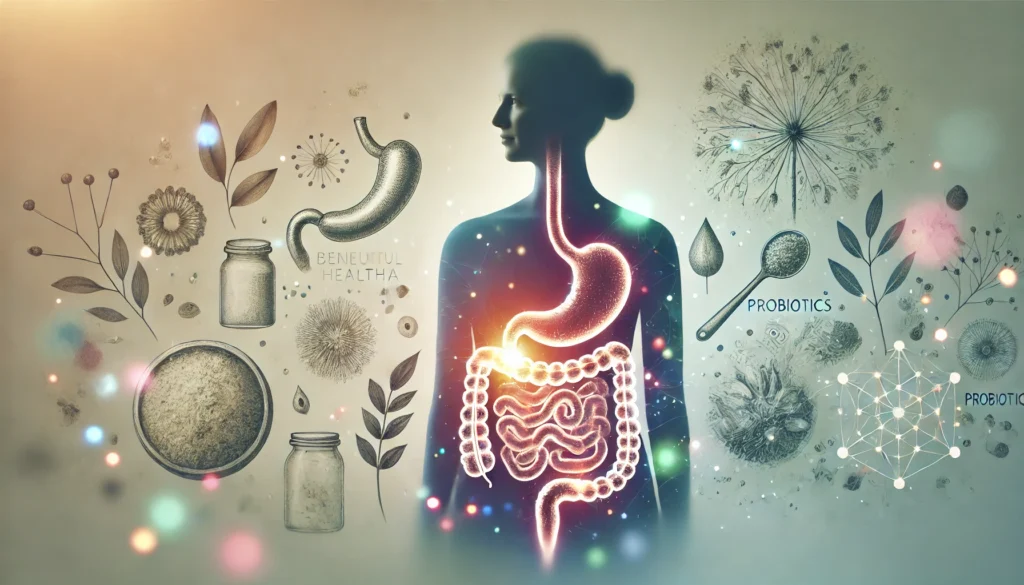Understanding the Importance of Probiotics for Women’s Health
The human body hosts trillions of microorganisms, many of which play a vital role in maintaining overall health. Probiotics, often referred to as “good bacteria,” are essential for gut health, digestion, and immune function. For women, these microorganisms can be particularly beneficial in addressing common health concerns, including digestive disorders, vaginal health issues, and immune system support. By integrating the best probiotics for women into a daily routine, it is possible to enhance well-being and prevent various health issues.
You may also like: How to Improve Gut Health Naturally: Science-Backed Tips for a Stronger Microbiome
Women face unique biological challenges that influence their microbiome, including hormonal fluctuations, pregnancy, menopause, and susceptibility to infections such as yeast overgrowth and urinary tract infections. Good probiotics for women can help restore microbial balance, alleviate symptoms of gastrointestinal discomfort, and even improve mental health by fostering a healthy gut-brain connection. The ability of probiotics to regulate digestion, reduce inflammation, and support the immune system underscores their significance in women’s health.
When choosing the best female probiotic, it is important to understand the different strains and how they affect health. Some strains are particularly effective in preventing and treating yeast infections, while others can aid in reducing bloating and constipation. With a deeper understanding of these microorganisms, women can make informed choices regarding top-rated probiotics for women and incorporate them into their lifestyle for optimal health benefits.
How Probiotics Work in the Female Body
The gut microbiome is a complex ecosystem composed of bacteria, viruses, and fungi that influence various bodily functions. Probiotics introduce beneficial bacteria into the gut, promoting balance and preventing the overgrowth of harmful microbes. This is particularly important for women, as disruptions in gut flora can lead to digestive distress, weakened immunity, and increased susceptibility to infections.
A well-functioning gut is crucial for digestion and nutrient absorption. Probiotics support the breakdown of food, enhance the absorption of essential vitamins and minerals, and reduce symptoms of digestive disorders such as bloating, gas, and constipation. Women struggling with female constipation can benefit from the best probiotic for female constipation, which helps regulate bowel movements and promote a healthier digestive system.
Additionally, the female reproductive system is home to its own unique microbiome. Lactobacillus strains, commonly found in pre and probiotics for women, help maintain vaginal health by preventing the overgrowth of yeast and harmful bacteria. This is particularly beneficial in preventing infections such as bacterial vaginosis and candidiasis. Probiotics also enhance immune function by stimulating the production of antibodies and reducing inflammation, making them a crucial component of overall wellness.

Selecting the Best Probiotic That Works for Women
Choosing the right probiotic involves understanding specific strains and their benefits. Different probiotic strains target various health concerns, and selecting the most appropriate one can significantly impact overall health. Some of the most effective strains for women include:
- Lactobacillus rhamnosus GG – Known for its ability to prevent and treat vaginal infections and support gut health.
- Lactobacillus acidophilus – Helps maintain a balanced vaginal microbiome and supports digestion.
- Bifidobacterium lactis – Enhances immune function and aids in digestion.
- Saccharomyces boulardii – A yeast-based probiotic that can help with diarrhea and gut inflammation.
- Lactobacillus reuteri – Supports vaginal health and prevents urinary tract infections.
The best selling female probiotics often contain a combination of these strains to maximize benefits. Probiotics can be found in various forms, including capsules, powders, and fermented foods such as yogurt, kefir, and kimchi. While dietary sources provide a natural way to incorporate probiotics, supplements offer a concentrated and convenient option for those who need a higher dosage.
Best Probiotic for Women Over 50
As women age, hormonal changes, particularly during menopause, can impact gut health and overall well-being. The best probiotic for women over 50 should focus on maintaining digestive balance, reducing inflammation, and supporting bone and heart health. Probiotics can aid in reducing menopause-related symptoms such as bloating, weight gain, and weakened immunity.
Strains like Bifidobacterium breve and Lactobacillus plantarum are particularly beneficial for older women, as they help maintain a healthy gut environment and enhance calcium absorption, reducing the risk of osteoporosis. Additionally, probiotics can improve mental health by supporting neurotransmitter production, which is crucial in managing mood swings and cognitive function in postmenopausal women.
Best Probiotics for Yeast Infection Prevention and Treatment
Yeast infections are a common concern for many women, often caused by an overgrowth of Candida albicans. The best probiotics for yeast infection are those containing Lactobacillus acidophilus and Lactobacillus rhamnosus, which help maintain a healthy vaginal microbiome and prevent yeast overgrowth. Regular consumption of these probiotics can reduce the recurrence of infections and support overall reproductive health.

Frequently Asked Questions About Probiotics for Women
1. What makes a probiotic effective for women’s health?
The effectiveness of a probiotic for women depends on the specific bacterial strains included in the formula. The most beneficial strains for women target digestive health, immune support, and vaginal flora balance. Lactobacillus and Bifidobacterium strains, such as Lactobacillus rhamnosus, Lactobacillus reuteri, and Bifidobacterium lactis, have been extensively studied for their ability to enhance gut and reproductive health. Additionally, an effective probiotic should have a high CFU (colony-forming unit) count to ensure the bacteria survive stomach acid and reach the intestines. The best female probiotic formulas also include prebiotics, which act as fuel for probiotics, increasing their effectiveness.
2. How do probiotics help with hormonal balance in women?
Probiotics influence hormone regulation by supporting gut health, which is closely linked to endocrine function. A well-balanced microbiome aids in the metabolism and excretion of estrogen, preventing hormonal imbalances that can contribute to conditions such as polycystic ovary syndrome (PCOS) and menopause-related symptoms. The best probiotics for women over 50 often contain strains like Lactobacillus acidophilus and Bifidobacterium bifidum, which assist in hormone stabilization. Additionally, gut health plays a role in serotonin production, which can help improve mood swings and stress levels associated with hormonal fluctuations. Women experiencing irregular menstrual cycles or menopause-related changes may benefit from incorporating top-rated probiotics for women into their routine.
3. Are probiotics beneficial for preventing and treating yeast infections?
Yes, certain probiotic strains help prevent and treat yeast infections by maintaining a balanced vaginal microbiome. Lactobacillus rhamnosus and Lactobacillus reuteri are known for their ability to combat Candida albicans, the primary fungus responsible for yeast infections. The best probiotics for yeast infection work by increasing the presence of beneficial bacteria, which lower vaginal pH and create an inhospitable environment for harmful microbes. Regular intake of good probiotics for women can help reduce recurrence rates of yeast infections, particularly for women prone to frequent infections. For best results, probiotics should be taken alongside a diet low in sugar and refined carbohydrates, as these can promote yeast overgrowth.
4. How can probiotics help with female constipation?
Women are more likely to experience constipation due to hormonal fluctuations, pregnancy, and dietary factors. The best probiotic for female constipation includes strains such as Bifidobacterium lactis and Lactobacillus plantarum, which help regulate bowel movements by improving gut motility and stool consistency. These probiotics enhance the digestion of fiber and the production of short-chain fatty acids, which stimulate intestinal movement. Unlike laxatives, probiotics provide a long-term solution by addressing the root causes of constipation, such as gut flora imbalances and slow digestion. Incorporating pre and probiotics for women can further enhance digestive function by ensuring beneficial bacteria have adequate nourishment.
5. What is the difference between probiotics and prebiotics, and why do women need both?
Probiotics are live beneficial bacteria, while prebiotics are non-digestible fibers that feed these bacteria, promoting their growth and activity. Women benefit from both because prebiotics enhance the survival and function of probiotics, ensuring they colonize effectively in the gut. The combination of pre and probiotics for women is particularly useful for improving digestion, enhancing nutrient absorption, and preventing bloating and gas. Prebiotics are found naturally in foods such as bananas, onions, garlic, and asparagus, but many best rated probiotics for women also include prebiotic fibers to increase effectiveness. A well-balanced intake of both supports gut health, immune function, and overall well-being.
6. Are probiotics necessary for women over 50?
Yes, the best probiotic for women over 50 can support digestive health, immune function, and bone strength. As women age, changes in gut microbiota occur due to factors such as reduced stomach acid production, dietary shifts, and hormonal changes. Probiotics containing Bifidobacterium longum and Lactobacillus casei can help counteract age-related digestive issues like bloating, irregularity, and nutrient malabsorption. Additionally, probiotics support bone health by aiding calcium absorption, which is crucial for preventing osteoporosis. By incorporating top-rated probiotics for women, older women can enhance overall health and maintain a strong digestive and immune system.
7. How do I know if my probiotic is working?
The benefits of a probiotic for women can take time to become noticeable, typically between two to four weeks of consistent use. Positive signs include improved digestion, regular bowel movements, reduced bloating, and increased energy levels. Women taking best selling female probiotics for vaginal health may notice fewer yeast infections and improved pH balance. If symptoms such as gas or mild bloating occur initially, this is often a temporary adjustment phase as the gut microbiome shifts. To ensure effectiveness, look for best rated probiotics for women with high-quality strains and CFU counts that align with your health goals.
8. Can probiotics improve skin health in women?
Yes, probiotics contribute to skin health by reducing inflammation and promoting a balanced gut microbiome, which is closely linked to skin conditions such as acne, eczema, and rosacea. Strains such as Lactobacillus rhamnosus and Bifidobacterium breve help modulate immune responses and reduce systemic inflammation, leading to clearer skin. Many women find that using good probiotics for women improves their skin’s hydration, elasticity, and overall appearance. Additionally, probiotics can help counteract the effects of stress-induced breakouts by supporting gut-brain communication. Choosing best selling female probiotics with skin-supportive strains can provide an added benefit for those looking to improve both digestive and skin health.
9. Do probiotics help with weight management?
Emerging research suggests that probiotics can play a role in weight management by influencing metabolism and reducing fat storage. Specific strains such as Lactobacillus gasseri and Bifidobacterium breve have been linked to reductions in abdominal fat and improved insulin sensitivity. The gut microbiome affects hunger hormones and inflammation levels, both of which contribute to weight fluctuations. While probiotics are not a standalone solution for weight loss, incorporating the best female probiotic into a balanced diet and active lifestyle can support healthy weight regulation. Women seeking additional metabolic support should look for top-rated probiotics for women that include these strains.
10. Can I take probiotics with antibiotics?
Yes, but it’s essential to choose the best probiotics for women that can withstand antibiotic treatment. Antibiotics eliminate both harmful and beneficial bacteria, potentially leading to digestive issues and yeast infections. To prevent these side effects, take probiotics with Saccharomyces boulardii, a yeast-based strain resistant to antibiotics, along with Lactobacillus acidophilus, which helps replenish gut bacteria. Taking a probiotic at least two hours apart from antibiotics can minimize interference and maximize effectiveness. After completing a course of antibiotics, continuing with best selling female probiotics can help restore balance to the microbiome and prevent post-treatment digestive issues.

Conclusion: Enhancing Women’s Health with Probiotics
Incorporating the best probiotics for women into a daily routine can significantly improve gut health, digestion, and immunity. With a variety of top-rated probiotics for women available, selecting the right strains can address specific health concerns such as digestive discomfort, yeast infections, and immune function. Understanding the role of probiotics in the female body empowers women to make informed health choices and optimize their well-being naturally. Whether through dietary sources or supplements, probiotics provide a powerful tool for maintaining overall health and vitality throughout different stages of life.
gut microbiome support, digestive health supplements, women’s wellness probiotics, natural gut balance, immune-boosting bacteria, microbiome restoration, probiotics for bloating relief, gut-friendly supplements, best gut health products, lactobacillus benefits, bifidobacterium strains, vaginal microbiome care, probiotics for digestion, natural remedies for yeast infections, fermented foods benefits, digestive enzymes and probiotics, probiotics for hormonal health, gut-brain connection, prebiotic-rich foods, daily probiotic regimen
Further Reading:
11 Probiotic Foods That Are Super Healthy
Probiotics 101: A Simple Beginner’s Guide
Top 5 Expertly Reviewed Probiotics For Gut Health and Digestion in 2025
Disclaimer
The information contained in this article is provided for general informational purposes only and is not intended to serve as medical, legal, or professional advice. While Health11News strives to present accurate, up-to-date, and reliable content, no warranty or guarantee, expressed or implied, is made regarding the completeness, accuracy, or adequacy of the information provided. Readers are strongly advised to seek the guidance of a qualified healthcare provider or other relevant professionals before acting on any information contained in this article. Health11News, its authors, editors, and contributors expressly disclaim any liability for any damages, losses, or consequences arising directly or indirectly from the use, interpretation, or reliance on any information presented herein. The views and opinions expressed in this article are those of the author(s) and do not necessarily reflect the official policies or positions of Health11News.


